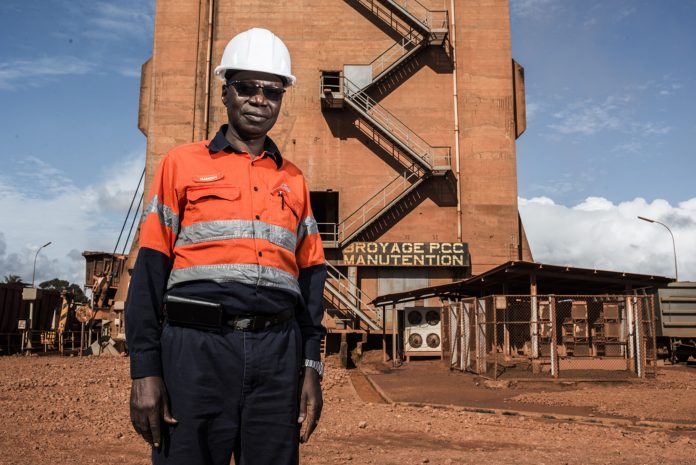Red bauxite powder mined by Guinea’s biggest producer — flowing past a mangrove swamp on a conveyor belt and plunging through a giant funnel into the Rio Tamara ship — has been the country’s steadiest source of income since it was first mined four decades ago.
The company churning out the ore — owned by Rio Tinto Plc, Alcoa Inc., Dadco Alumina & Chemicals Ltd. and the government — will also lead a new wave of investment that may spur the West African nation’s economy and more than double bauxite output, which is refined and then smelted into aluminum.
Compagnie des Bauxites de Guinee’s $1 billion plan will almost double its annual production to 28.5 million metric tons within five years, Chief Executive Officer Namory Conde said. Four other developments could see a further 20 million tons added to Guinea’s annual exports.
“There’s going to be a lot more bauxite coming out of Guinea,” Conde said at CBG’s headquarters in the town of Kamsar, where the ship was being loaded. “Our quality is much better than around the world. Our deposits are easily accessible. We know that aluminum demand will grow again. We’ll have dips, but it’ll grow.”
With aluminum close to the six-year low of $1,506 a ton reached last month due to ample supply from China, cheaper prices for the metal have spurred bauxite orders. An export ban since January 2014 by Indonesia, which was the third-largest miner of the material, has seen buyers looking for alternative sources. The metal for delivery in three months rose 0.1 percent to $1,625 a ton at 1:47 p.m. in Singapore.
“There is a definite need for more bauxite capacity,” Michael Insulan, an analyst at research firm CRU Group, said by e-mail. “But with the many multi-million-ton projects out there, there is a risk of oversupply.”
Guinea needs the development. An Ebola epidemic and a slump in commodity prices left the International Monetary Fund forecasting no economic growth this year. With 43 percent of its population of 12 million people living on less than $1.25 a day, Guinea ranks as the ninth least developed country globally, according to United Nations data.
“There aren’t jobs,” Aboubakar Toure, 34, who sells fuel along Kamsar’s bustling main road, said while pointing at one of CBG’s trains screeching along to the port. “We’ve got lots of wealth, but none of it reaches us.”
Elections Planned
President Alpha Conde on Oct. 11 will seek re-election, five years after winning the first vote judged as democratic since independence from France in 1958. Since then, he’s implemented a new mining code, started a review of old contracts, won $2.1 billion in debt relief and overseen construction of a Chinese-built hydropower dam that’s tripled energy output and given most people in the capital, Conakry, steady electricity supply for the first time.
While investment conditions have improved following decades of military rule, the contract review and a lack of government experience in seeing major projects through have put off some investors.
BHP Billiton Ltd. jettisoned three projects during Conde’s time. The nation’s iron-ore deposits, including Rio Tinto’s Simandou, have yet to live up to the hype of bringing railways into the mountainous jungle interior and doubling the size of the $6.6 billion economy.
Despite the improvement in the environment, Alliance Mining Commodities Ltd. CEO Bob Adam is “extremely concerned” about finding the $850 million to build the railway and ports for his mine, he said in an interview.
Because much of Guinea’s bauxite, which makes up more than a quarter of the world’s known reserves, is shallow and close to the coast, some projects may come online soon.
Alufer Mining Ltd. is targeting 5 million tons of production at its Bel Air mine in the middle of 2017. China Hongqiao Group Ltd. is close to buying another 5 million tons annually from a $300 million operation that saw a river port built within months, with plans to double that amount. Alliance Mining Commodities wants to add a further 5 million tons a year. Guinea Alumina Corp. has agreed to buy some of CBG’s product and invest $5 billion in building a mine, railway, bauxite terminal and, by 2022, an alumina refinery.
“The current government has demonstrated a willingness to change,” said Mamady Youla, GAC’s corporate affairs director. “Guinea has a lot of resources. To turn this into wealth, we need investment.”













